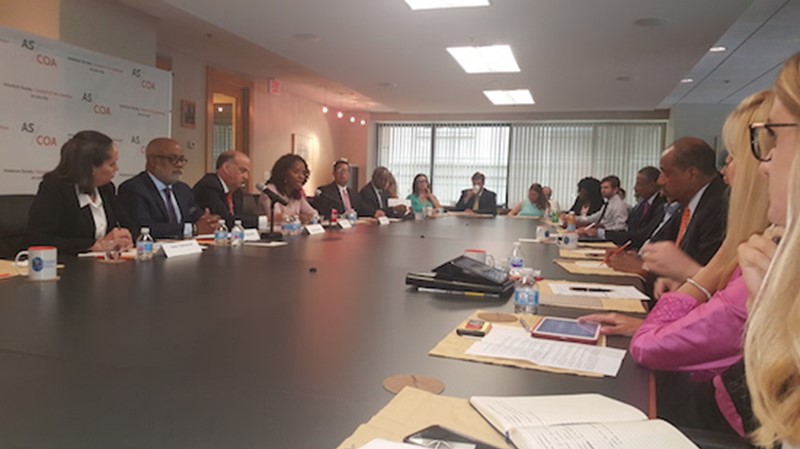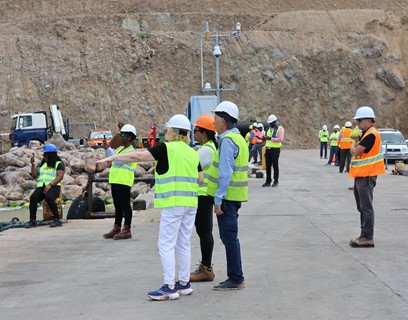
The Caribbean stands at a delicate crossroad in this new global order. The rise of ‘Trumpism’ is not a closed in American experience, but more so, a collective bombardment upon the senses and sensibilities of all regions far and wide where the influence of the United States is felt.
The Caribbean Basin over the years has had to contend with being the back door of the United States. In many aspects, this relationship has served the Caribbean well, as the region has profited from direct tourism relations, coupled with ease of access for the transportation and shipment of goods for trade purposes.
Politically, the Caribbean has seen semi-involvement of the United States directly in its political affairs, with the most notable being the military intervention in several Latin American Countries, and also in Grenada, within the English speaking Caribbean when Maurice Bishop was considered by President Reagan to be too far left in his inclinations.
Venezuela has in recent times occupied much of the geo-political interaction of the US State Department within the region from since before and after the death of Leftist ideologue Hugo Chavez. Presently in Venezuela the crisis that has enveloped the nation has crippled the economy and has created a movement of people unlike any seen in the Caribbean/Central American region for quite some time. In fact the statistics point towards 2.3 million people having left Venezuela since 2014 in light of the current dire state of the country.
For the Caribbean, Venezuela is a dichotomy of sorts; in that the Petro-Caribe deal as was advanced by then President Chavez served some countries of the region well, and Chavez’s vision of a great Southern Alliance against the United States never fully saw its materialisation. However, today, many Caribbean governments are in a state of perplexity as to how to engage with Venezuela and still being on the good side of the United States at the same time. It is a problem with many levels of diplomatic engagement, as issues such as drug trafficking from within that territory loom large.
China’s hand in the Caribbean’s present condition is being played strategically. It has so far proven to be a very powerful hand, with very deep pockets of cash and influence. Many countries across the Caribbean have benefitted handsomely from the might of the Chinese spending power. But the question that faces the Caribbean presently, is at what price does this economic help come, in terms of its relationship with the United States?
The truth be told - across the Caribbean there are various pockets of hot issues – both socially and economically that need addressing. Haiti is still a sore on the region’s conscience that needs a proper redress.
But overall, the question that begs across the region as the Caribbean Basin considers its future in the Trump era, is that of how Strategically important is the Caribbean to the United States?
Does the region not lend itself to Chinese assistance as this may play it off against the United States? But if the voting in the United Nations is anything to go by, most Caribbean nations vote on the side of the United States’ policy directive. In return for what though is the consideration now on the table?
Truth is, the reality is that the Caribbean is broke. Many economies are struggling and are heavily debt ridden. Social issues too are climbing high and crime needs a combative element to halt its ever-increasing rise in many of the islands around the region.
Where will this assistance come from?
The Caribbean right now is in need of transformative leadership that impacts at all levels of its social and economic strata. To look to either China or the United States possibly may not even be the answer. This reliance on outside help has stifled creativity in some regards within the region.
The time is now for the region to look at itself and its people towards seeing how it can build capacity of the future, to push growth within the Caribbean. Indeed, governments will lean towards who is opening up their doors to assist them more so than anything else. However, within this epoch, the consideration has to come to the fore that the way in which some regional governments and some regional bodies have been operating is not fit for a 21st century Caribbean that wishes to be considered a true and serious global player.
The rhetoric of change from the region’s leaders must no longer be rhetoric for political advantage, but be actionable points that see true change being realised by examples of execution and delivery for the people in a new way.
Listen to the audio presentation below to MNI Media's Editor speaking on the Strategic Importance of the Caribbean to the United States, and the comments being responded to by both Kenneth H. Merten, Deputy Assistant Secretary, Bureau of Western Hemisphere Affairs, U.S. Department of State and Anton E. Edmunds, Ambassador of Saint Lucia to the U.S. and Permanent Representative to the OAS:
Note: Jeevan A. Robinson is Editor-in-Chief and Head of Business Development at Marketing, News & Information Media. You can reach him at jeevan@mnialive.com


